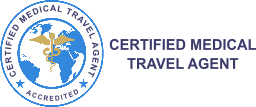In this blog, we will delve into the experiences and motivations of medical tourists and address common misconceptions about the cost and quality of medical treatment abroad. We’ll also explore the benefits for healthcare providers and the importance of addressing the challenges and risks of medical tourism for all stakeholders. Join us as we examine the latest research on medical tourism:
The Characteristics of Medical Tourists
One of the most vital aspects of medical travel is the patient experience. Research has shown that the majority of medical tourists are traveling for elective procedures, such as cosmetic surgery, dental implants, and fertility treatments. These procedures are often cheaper and more readily available abroad than in their home country. Additionally, a large volume of patients travel abroad for specialized care that is not available in their home country. For example, many cancer patients travel abroad for advanced treatments such as proton therapy and CAR-T cell therapy. Patients have reported high satisfaction with their medical tourism experience, including the quality of care and communication with providers.
Addressing Misconceptions about Cost and Quality
It’s not uncommon for patients to question the lower cost of dental and medical procedures in other countries. Some may assume that a lower cost means lower quality. In many cases, the reason is that countries with a lower cost of living will have lower labor costs and less expensive real estate, meaning the dental and medical offices can operate with much lower overhead costs than other clinics. Additionally, in some countries, malpractice insurance premiums are significantly lower and there may not be government mandates requiring dental and medical professionals to purchase malpractice insurance. This savings can be passed on to the patient. Furthermore, if the dentist or physician was educated outside of the country, they most likely didn’t leave school with a large amount of student loan debt, allowing them to offer lower costs for the procedures.
How Healthcare Providers Benefit
Medical travel also has a number of benefits for healthcare providers. In some cases, providers in countries with less developed healthcare systems can benefit from the revenue generated by medical tourism. This revenue can be used to improve healthcare infrastructure and access to care for the local population. Furthermore, medical tourism can also increase access to specialized care for patients, which can help to improve patient outcomes and reduce healthcare costs.
In conclusion, healthcare travel has a number of benefits for both patients and healthcare providers. While there are also some challenges and risks, it is crucial for industry stakeholders such as medical travel agencies, hospitals, and clinics to work towards addressing these challenges and ensuring that health tourism is a safe and effective option for patients.
Reach Your Full Potential in Medical Tourism with MTB
At MTB, we are dedicated to supporting professionals and organizations in the medical tourism industry as they strive for success. As a leading provider of certification, contracts, marketing, and support, we offer comprehensive programs, expert guidance, and valuable resources that are designed to help our members achieve their goals and reach their full potential in the global healthcare market. With a focus on excellence and innovation, we help our members stay ahead of the competition and navigate the complex and dynamic world of medical tourism.
Tel/WhatsApp: +1 (561) 909-7178








